Key takeaways:
- Front-end interviews assess both technical skills and effective communication of thought processes.
- Preparation strategies should include understanding interview dynamics, practicing articulately, and researching potential employers.
- Key front-end skills are proficiency in HTML, CSS, JavaScript, responsive design principles, and familiarity with frameworks like React or Vue.
- Mock interviews and feedback are vital for improving both technical skills and communication clarity during actual interviews.
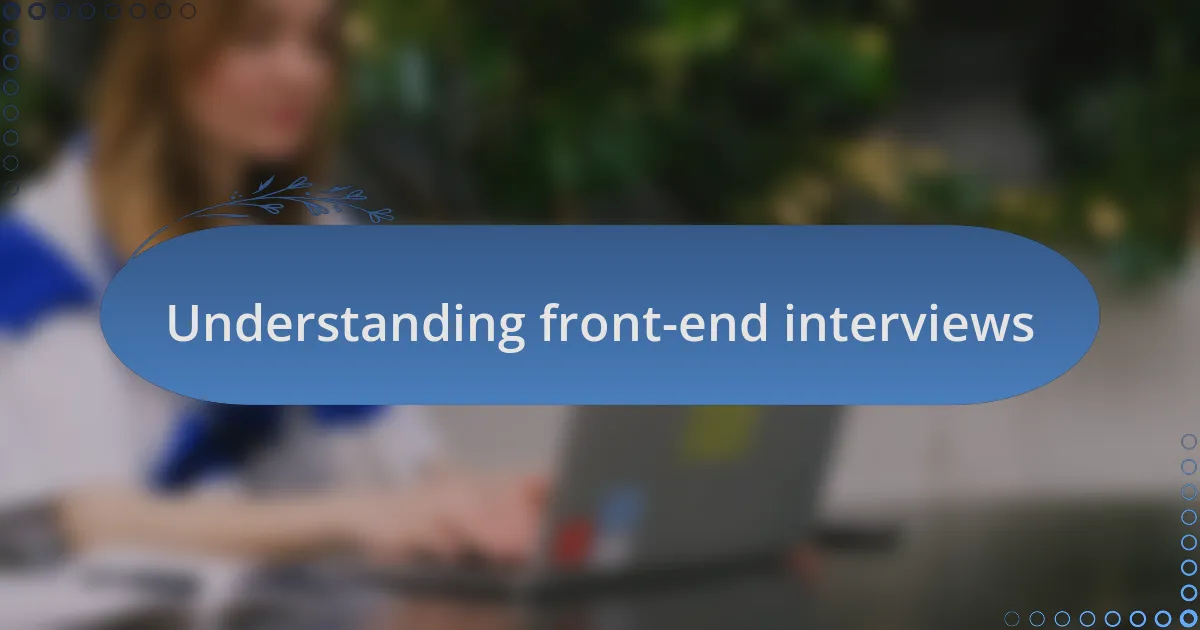
Understanding front-end interviews
Front-end interviews can often feel like navigating a maze filled with technical questions and real-world problems. I remember my first interview vividly; I was a bundle of nerves, wondering if I could demonstrate my skills effectively while also making a good impression. When you dive into these interviews, it’s essential to remember that they’re not just assessing your technical prowess but also how you communicate your thought process.
As I prepared, I found that reviewing common front-end concepts—like HTML, CSS, and JavaScript—was just the tip of the iceberg. Often, I encountered algorithmic challenges that tested my problem-solving abilities, and at times, I felt overwhelmed. Reflecting on those experiences, I realized that interviews are as much about how you approach these problems as they are about finding the right solution. Has anyone else felt that moment of panic when faced with a question that seems to come out of nowhere?
Practicing with peers and mock interviews was a game changer for me. Not only did it help to build my confidence, but it also gave me a safe space to learn how to articulate my ideas clearly. I’ve learned that every question posed during an interview is an opportunity to showcase not just your knowledge but your passion for front-end development. How do you turn a question into a chance to impress? It’s about showing your enthusiasm and willingness to learn and grow, which often resonates with interviewers.
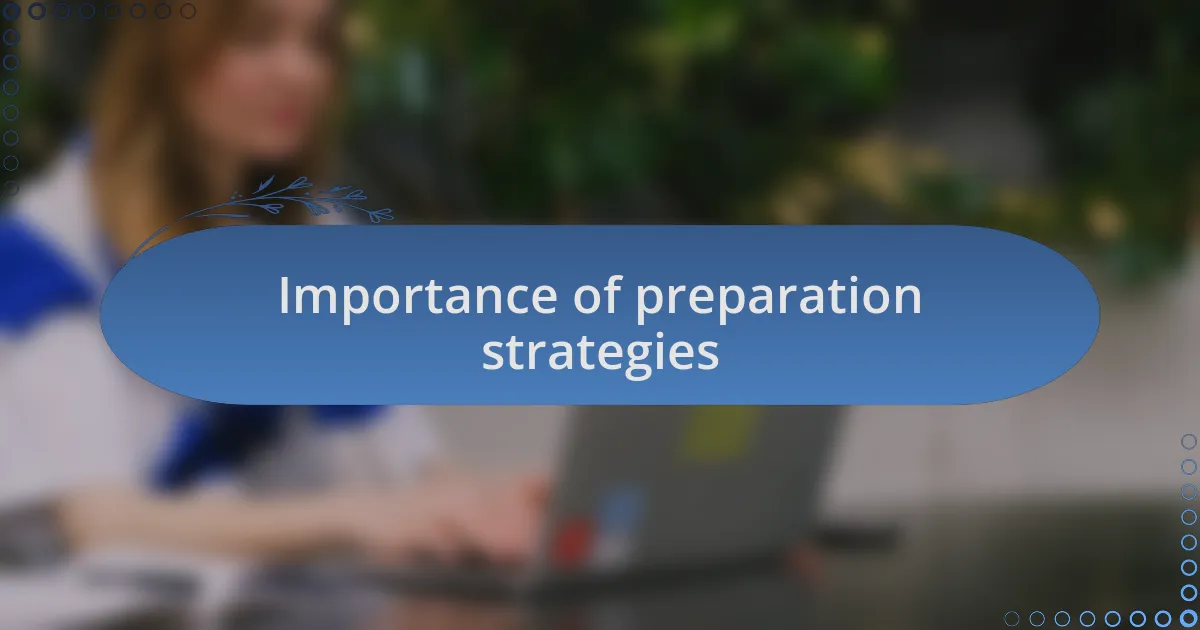
Importance of preparation strategies
Preparation strategies for front-end interviews are crucial because they equip you with the tools to tackle unexpected challenges. I distinctly remember a time when a surprise question about responsive design threw me off balance. Had I not prepared by studying various frameworks and their nuances, my response would have fallen flat, likely diminishing my chances of advancing in the interview process.
I also realized that preparation goes beyond just technical skills; it’s about understanding the interview dynamics. When I practiced explaining my thought process out loud, it became clear that clarity and confidence in communication play pivotal roles. I would even rehearse answering common questions in front of a mirror. Have you ever noticed how rehearsing can convert anxious jitters into an assured presence?
Another aspect of preparation I found invaluable was gathering insights about the companies I interviewed with. It felt like stepping into the interview room armed with knowledge about their recent projects or values. This not only boosted my confidence but also allowed me to ask informed questions, demonstrating a genuine interest. It made me wonder, how often do candidates miss this opportunity by neglecting to research? I believe that when you connect your skills with the company’s vision, it truly enhances your chances of making a memorable impression.
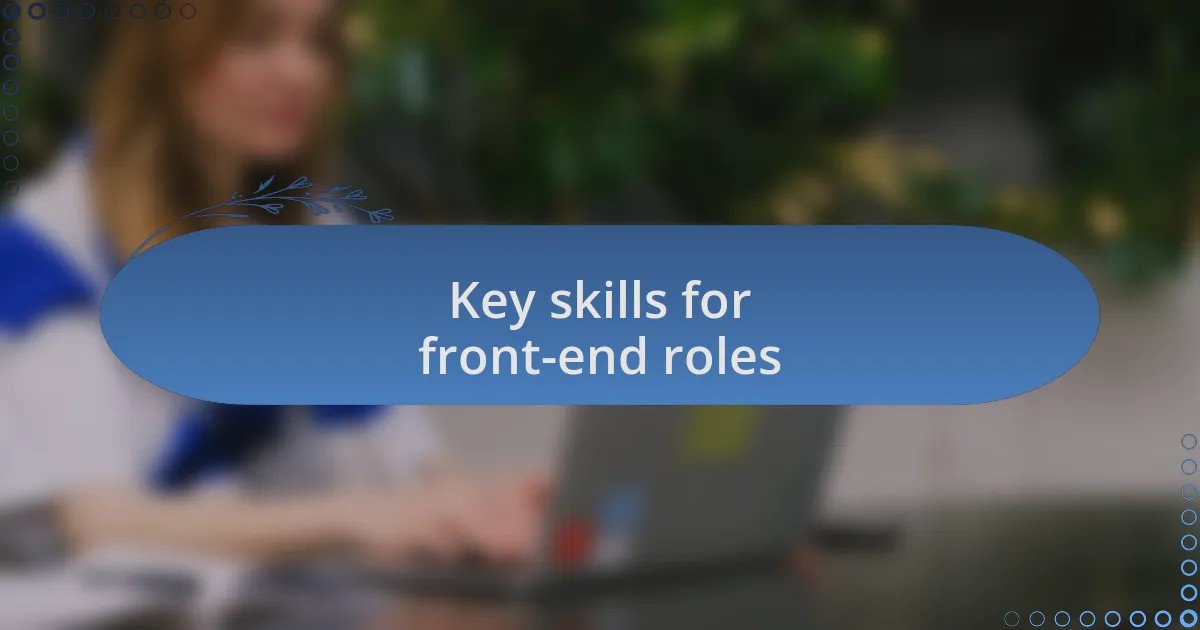
Key skills for front-end roles
The core skills required for front-end roles primarily revolve around proficiency in HTML, CSS, and JavaScript. Mastering these technologies is not just about writing code; it’s about creating an engaging user experience. I recall an instance when I implemented a complex layout using Flexbox. It was like solving a puzzle that required patience and creativity, ultimately enhancing the way users interacted with a feature-rich page.
In addition to technical acumen, a solid understanding of responsive design principles is a must. After encountering challenges with mobile compatibility early in my career, I realized that grasping how to create fluid layouts was essential. Have you ever tried using a website on your phone only to find it nearly unusable? I can tell you that without a responsive approach, even the most beautiful site can fall flat on smaller screens.
Moreover, familiarity with frameworks like React or Vue can set you apart in today’s competitive landscape. When I first dove into React, I was captivated by its component-based architecture—everything made sense, and I felt like I was building with Legos again. It’s fascinating how these tools not only streamline development but also enhance maintainability, allowing for scalable applications. Can you see how such frameworks can transform your development approach? They certainly elevated mine, equipping me for more dynamic projects and collaborations.
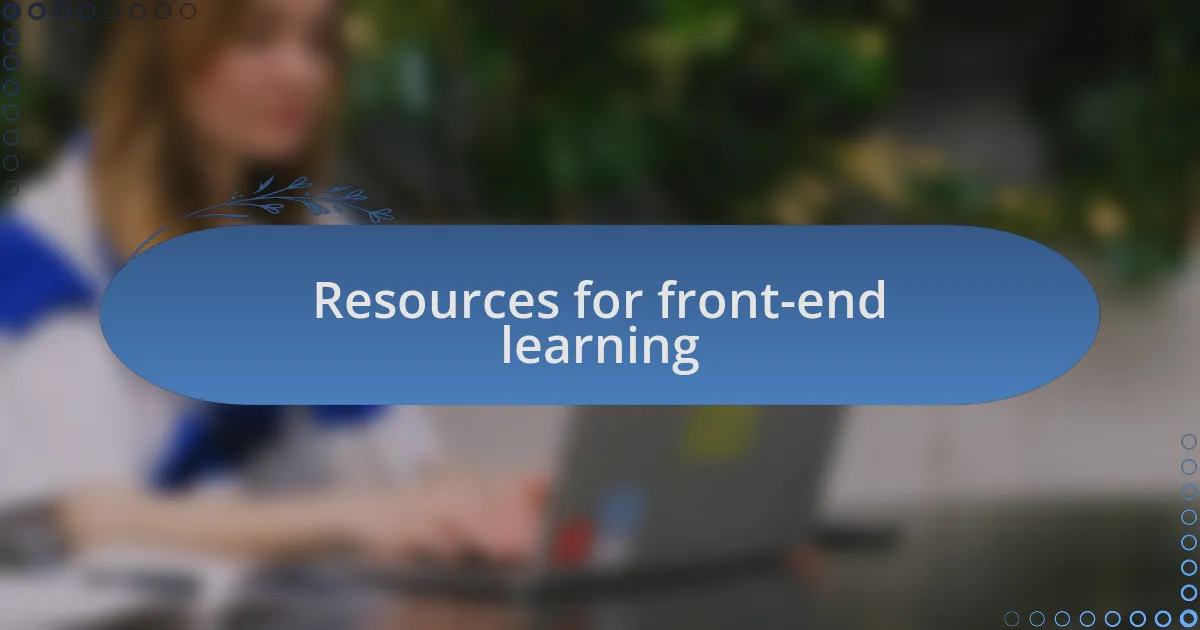
Resources for front-end learning
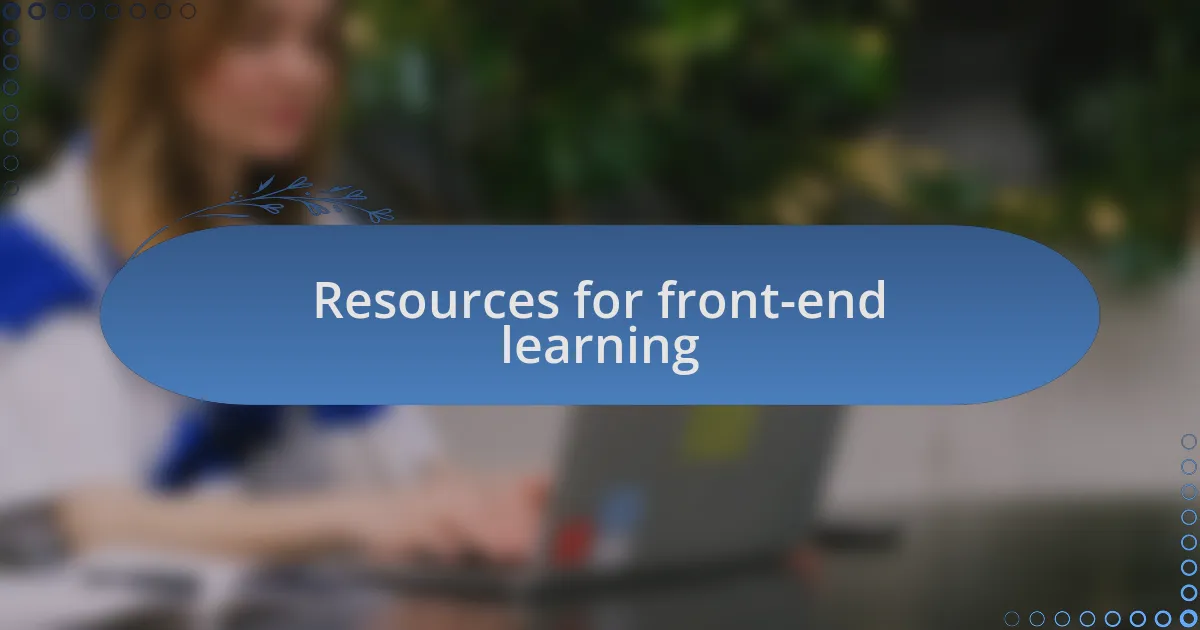
Resources for front-end learning
There’s a wealth of resources available that can accelerate your journey in front-end development. I often recommend free platforms like Codecademy and freeCodeCamp for their hands-on approach. I still remember the satisfaction I felt after completing my first project on these sites—it’s like taking your first steps into creating something truly yours. Have you experienced that rush of building something from scratch? It’s unforgettable!
Another invaluable resource is online communities such as Stack Overflow and GitHub. They provide not just code snippets and solutions, but also foster connections with other developers. I remember a time when I was stuck on a particularly tricky bug and turned to GitHub. The support I received from the community was incredible, and it taught me the importance of collaboration. It’s reassuring to know you’re not alone in this journey.
Additionally, books like “Eloquent JavaScript” offer profound insights into the language and its application. When I first tackled this book, I discovered not just the technical side of JavaScript but also its artistry. The first time I implemented what I learned in a real project, the code felt like a new form of expression. What resources have had the greatest impact on your learning? Identifying these can guide you toward a more fulfilling development path.
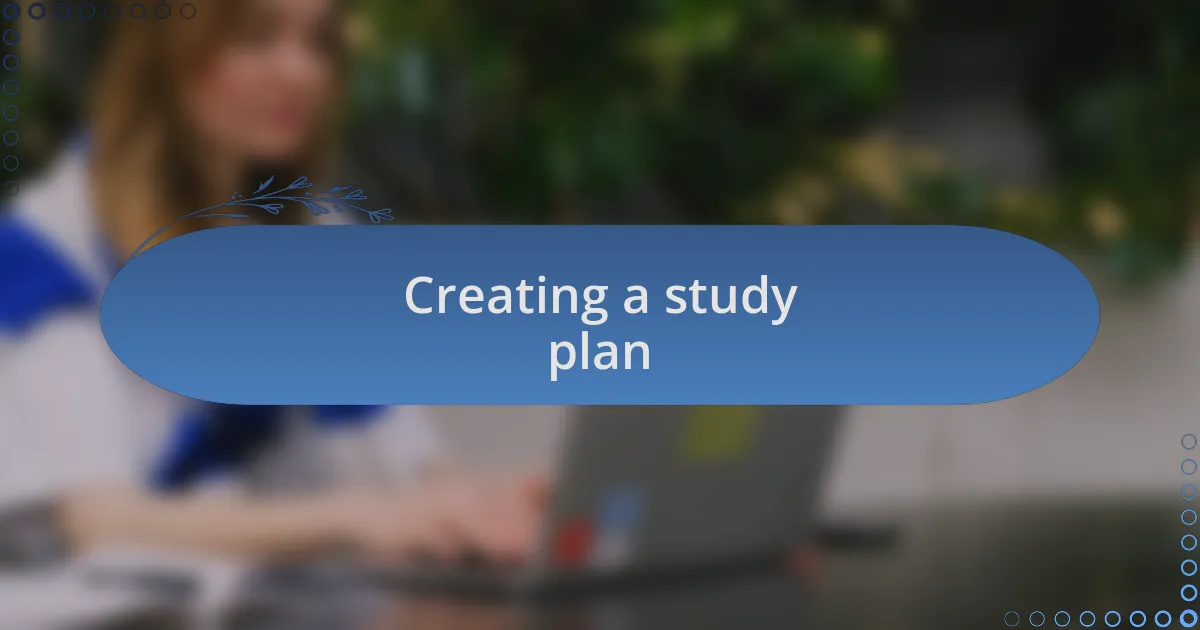
Creating a study plan
Creating a study plan is crucial for effective preparation. I usually start drafting mine by outlining the specific topics I need to cover, like HTML, CSS, and JavaScript frameworks. One time, I made a detailed weekly schedule that included time for both theoretical learning and hands-on practice, and it made a world of difference—I felt more organized and less overwhelmed as I approached my interviews.
In my experience, breaking down complex topics into manageable chunks is key. For instance, when learning about responsive design, I allocated specific days to focus on CSS Grid and Flexbox separately. This method allowed me to grasp each concept deeply rather than just skimming over them. Have you found that a targeted approach helps you retain information better?
Lastly, I always set aside time for mock interviews in my study plan. Practicing with a friend or using platforms like Pramp has not only helped me develop my problem-solving techniques but also boosted my confidence. Reflecting on those moments of simulated pressure really prepared me for the real interviews—I still remember the rush of adrenaline after completing my first mock session. Have you thought about how practice can transform your preparation experience?
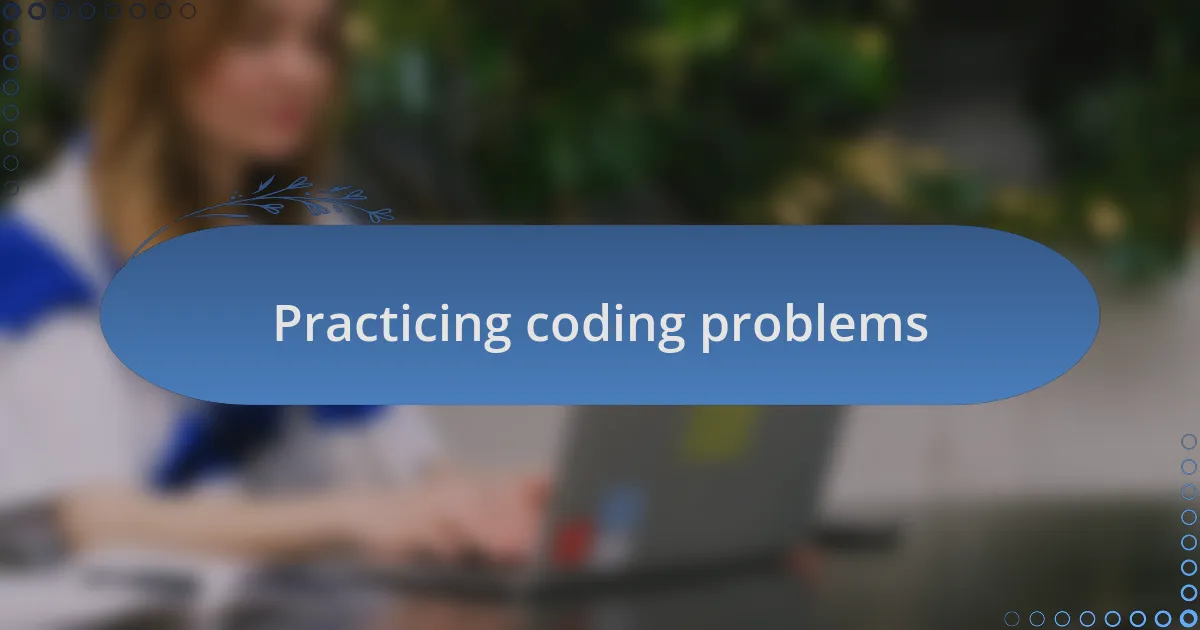
Practicing coding problems
I find that practicing coding problems is one of the most effective ways to boost my confidence ahead of front-end interviews. I often use platforms like LeetCode or HackerRank, where I tackle various challenges related to algorithms and data structures. There was one week where I committed to solving one problem a day, and not only did my skills improve, but I also noticed my problem-solving mindset began to shift—suddenly, I was approaching coding challenges with excitement rather than fear. Have you ever felt the thrill of solving a tough problem that once seemed insurmountable?
To make the most out of my practice sessions, I intentionally mimic the pressure of actual interviews. I set a timer for each coding problem to simulate the time constraints I’d face in a real scenario. There was a moment when I raced against the clock and barely managed to solve a problem in time. The adrenaline rush was intense, but it taught me how to handle pressure and think critically under stress. How do you prepare for that kind of pressure when you’re practicing?
Lastly, I focus on reviewing my solutions after completing problems. Taking the time to analyze my mistakes and understand different approaches deepens my comprehension. One memorable instance was when I discovered a more efficient solution than my original, leading to an “aha” moment that made all the difference for me. Have you considered how reviewing your work can illuminate new perspectives and techniques in your coding journey?
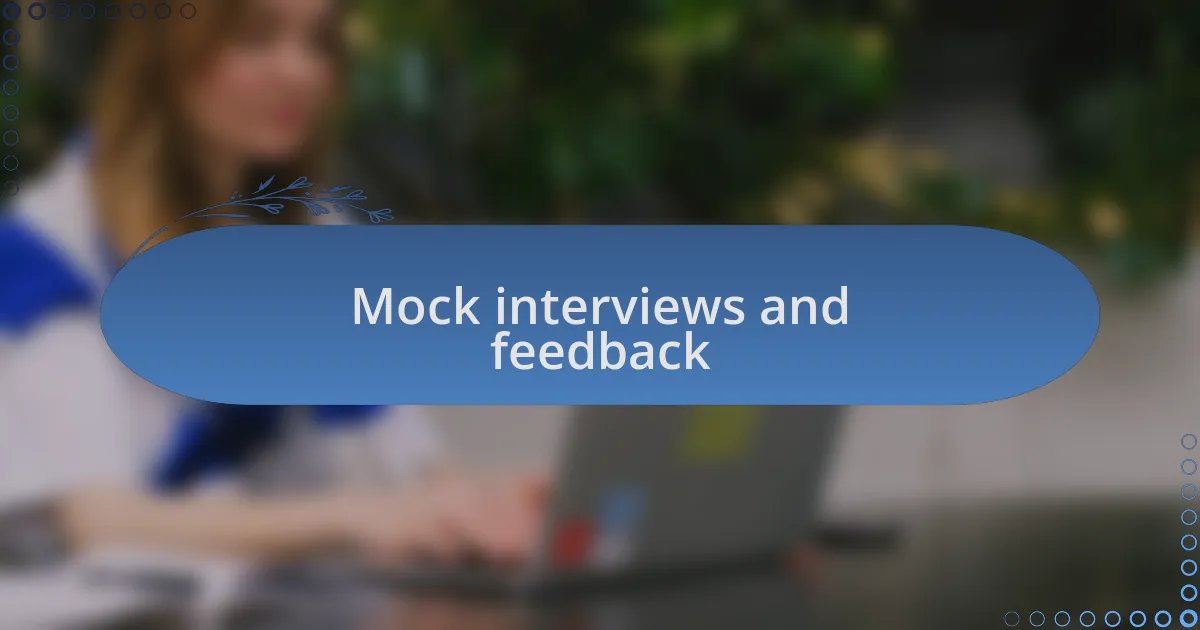
Mock interviews and feedback
Participating in mock interviews has been a game-changer for my preparation. The first time I tried it, I felt as if I were stepping onto a stage; the simulated environment pushed me to articulate my thought process clearly and confidently. One time, after a particularly challenging mock interview, the feedback I received helped highlight not just my technical weaknesses but also my communication style. Have you ever realized how vital clear communication can be, even when you know your code?
Engaging with peers or mentors during these mock sessions offers invaluable insights that I cherish. I recall one session where I made an off-hand comment about a solution strategy, and my partner challenged me to delve deeper. This led us to explore alternate approaches and best practices, transforming my understanding significantly. How often do you seize such opportunities for growth in your learning path?
Feedback from mock interviews can be eye-opening. I remember feeling blindsided by a recurring theme in the critiques I received—my nervous habit of over-explaining. It was a lightbulb moment for me; I realized that succinctness is key. Since then, I’ve worked hard to refine my delivery, balancing thoroughness with brevity. Have you given thought to how your own habits impact your interview performance?